“More importantly, if it passes through New York, we have jurisdiction no matter where it is now. If the wire transfer was made in New York, we have jurisdiction, no matter where it is now. If it was offered for sale, if it was shown at an auction – so, sure. My jurisdiction is limited to New York City, but to update a phrase – all roads lead to New York.”
Matthew Bogdanos, Manhattan Assistant District Attorney, New York, interviewed on Rescuing Stolen Art and Antiquities, CBS News, Sunday Morning (March 26, 2023).
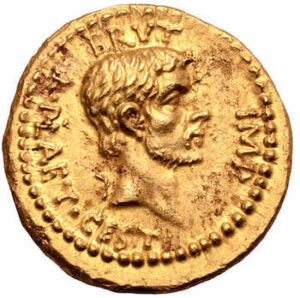
The Eid Mar Coin. Featuring the face of Marcus Junius Brutus, one of Julius Caesar’s assassins, courtesy Coins Weekly.
On the face of it, the Manhattan District Attorney’s Antiquities Trafficking Unit performed a service for the legitimate numismatic trade and collectors when it arrested Richard Beale, the principal at Roma Numismatics, last January for unlawfully purchasing valuable coins from Italy, Greece, and Gaza in violation of local national patrimony laws and creating false provenances to hide their illicit origins. After all, the ethics rules of the International Association of Professional Numismatists (IAPN) require members “[to] guarantee that good title accompanies all items sold, and never knowingly to deal in any item stolen from a public or private collection or reasonably suspected to be the direct product of an illicit excavation, and to conduct business in accordance with the laws of the countries in which they do business.”
IAPN members further promise “[T]o describe numismatic items accurately, and to refrain from any misrepresentation of origin, date, condition, provenance, pedigree, or value.” Obviously, the alleged conduct, if proven true, would violate these rules, which reflect best industry practices. Indeed, on learning that Italo Vecchi, an Italian coin dealer, was also named as a co-conspirator, IAPN suspended his honorary membership pending resolution of the case. (Richard Beale and Roma Numismatics were never IAPN Members.)
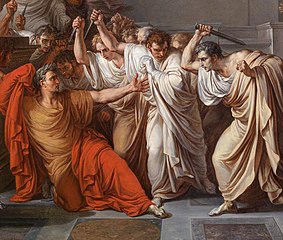
Vincenzo Camuccini (1771–1844), The Death of Julius Caesar (detail), between 1804 and 1805, Galleria Nazionale d’Arte Moderna e Contemporanea, Rome, Italy. Public domain.
On the other hand, subsequent reports that the ultimate buyer of the most valuable of the coins, an Aureus of Brutus, had surrendered it so it could be handed over to Greece should raise serious concerns for both the numismatic trade and collectors. The coin was sold at a public auction in London held in October 2020 for a record price of $4.2 million. The lot received considerable presale publicity. One would think if the Greek government had solid evidence that the coin was stolen from a Greek archaeological site, Greek authorities could have requested Scotland Yard to halt the auction so that the matter could be investigated.
Instead, years later, the Manhattan DA’s Antiquities Trafficking Unit engineered the repatriation to Greece after arresting Beale on fraud and stolen property charges based almost entirely on detailed allegations that Beale and Vecchi faked the provenance of the Brutus Aureus and another ancient silver coin from Naxos.
The real victim of any fraud was the buyer of the Brutus Aureus, who had been enticed to purchase the coin with the false provenance. So what was the basis for the decision to deprive that individual of his valuable purchase so it could be sent to Greece? According to a New York Times article which appears to be sourced to information provided by the Manhattan DA’s office, the decision hinged on the statement that “Experts said they believe the coin was likely discovered more than a decade ago in an area of current-day Greece where Brutus and his civil war ally, Gaius Cassius Longinus, were encamped with their army.” Tom Mashburg, Rare Coin, Minted by Brutus to Mark Caesar’s Death, is Returned to Greece, The New York Times (March 23, 2023).
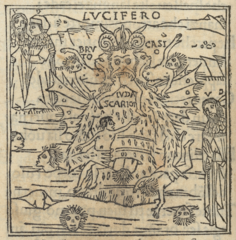
One of the most famous stories in history, in which Brutus is glorified – or damned. Illustration of Dante’s Inferno showing the Devil swallowing Brutus and the other assassins. Dante Alighieri, 1265-1321. Pico Master, active 1460-1505. Houghton Library, Harvard University, Cambridge, Mass. Public domain.
If repatriating a coin worth $4.2 million was indeed solely based on the speculation of unnamed experts, that should concern everyone. After all, Roman coins circulated from Britain to Sri Lanka, and scholars even disagree where Brutus minted his coins. So, absent additional evidence to support this contention, it would appear that any such “expert opinion” was concocted solely to justify the return, with some confidence that mainstream media wouldn’t ask too many hard questions that might call into question the Manhattan DA’s narrative.
All this could be considered “just a New York problem” if it weren’t for the Manhattan DA’s broad views of applicable laws and the office’s jurisdiction. See Rescuing Stolen Art and Antiquities, CBS News, Sunday Morning (March 26, 2023). The Manhattan DA makes these seizures based on the suspicion that cultural goods were unlawfully removed under foreign laws that declare anything found in that ground to be “state property.”
Many of these laws are antithetical to our own country’s views of private property rights enshrined in the 5th Amendment to the US Constitution. In the US, you own what you find on your own property. In other countries, that often is not the case. Moreover, as far as the Manhattan DA is concerned, the usual time and space limitations on prosecutorial discretion simply do not apply. More often than not, items are seized and repatriated after having been openly displayed for decades or sold multiple times at public auction. Such seizures are possible because no statute of limitations applies to “possession” of stolen property.
Additionally, the Manhattan DA believes that it can assert jurisdiction over any artifact, or any transaction related to that artifact, that passes through New York. But why should citizens of other countries or other states suffer threats of criminal prosecution from a local prosecutor because “all roads lead to New York”?
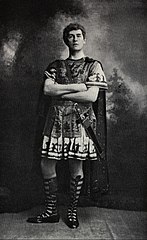
Otho Stuart (1863-1930) as Brutus in ‘Julius Caesar’ at Stratford-upon-Avon c1922. Public domain.
Indeed, one unethical standard operating procedure is to send threatening criminal subpoenas out of state demanding compliance, even though such subpoenas have no force of law.
The real underlying concern is the “ends justifies the means” approach of the Manhattan DA which reflexively pursues a none-too-subtle repatriationist agenda. Of course, all ancient and foreign coin collectors have already experienced such result-oriented decision making. Since 2007, State Department bureaucrats have imposed ever expanding import restrictions on historical coins even though it is impossible to link such items of commerce to find spots in a specific country. US law and the protection of private property rights enshrined in our Constitution demand a far more reasoned, not reactionary, approach.
Peter K. Tompa is a semi-retired lawyer who lives in Washington, D.C. He currently serves as outside counsel to the International Association of Professional Numismatists and as executive director to the Ancient Coin Collectors Guild. The opinions he expresses are his own and should not be taken as legal advice.
This article appeared first in Coins Weekly as “A Lawyer’s Assessment of the Return of the Brutus Aureus,” by Peter K. Tompa, on March 30, 2023. Cultural Property news thanks Coins Weekly and Mr. Tompa for permission.
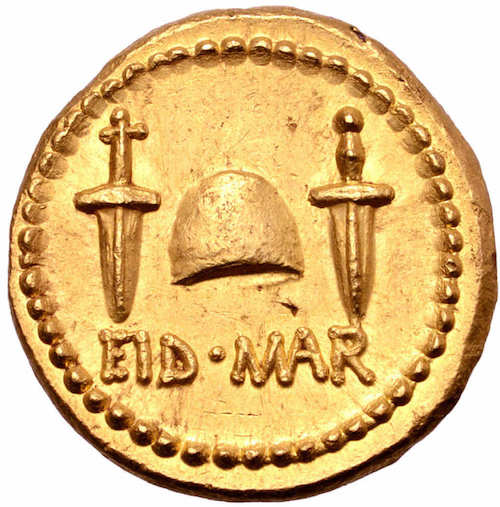 Eid Mar Coin commemorating the assassination of Julius Caesar. Courtesy Coins Weekly.
Eid Mar Coin commemorating the assassination of Julius Caesar. Courtesy Coins Weekly. 

